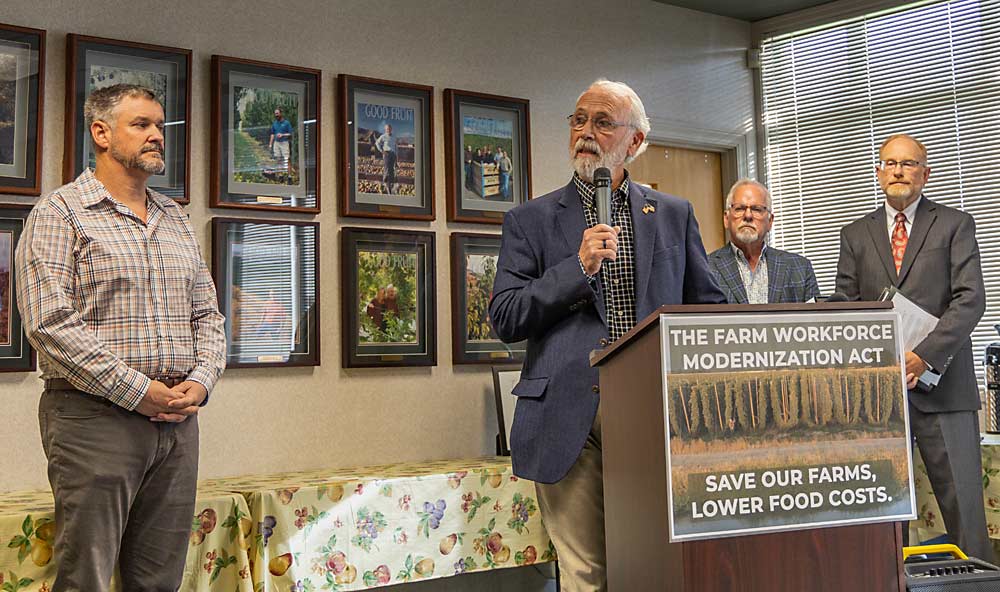
In a Yakima press conference, Washington Rep. Dan Newhouse urged his Senate colleagues to take action on the Farm Workforce Modernization Act before this legislative session ends at the end of the year.
“I’m calling on my Senate colleagues to come together so that we can finally fix the broken immigration system that we have,” he said of the legislation that he cosponsored, which would create a visa program for agricultural workers currently without legal status and make changes to the H-2A program. “It, in turn, will combat the rising food costs that every single American family across the country is currently facing.”
He spoke to the press after meeting with agricultural producers at the Washington State Fruit Commission’s offices in Yakima. Newhouse was joined at the podium by grower Kristin Kershaw of Domex Superfresh Growers; Tony Freytag, executive vice president of Crunch Pak, a fruit processor; Mark Powers, president of the Northwest Horticultural Council; and Jason Sheehan, a dairy farmer from the Yakima Valley.
“You might think that the obvious answer to a labor shortage is higher wages, but we have been paying higher wages since 2017 — with no increase in labor availability,” Kershaw said, citing the 30 percent increase in wages between 2017 and 2021, before the recent period of inflation. While her company relies on the H-2A program to bring in guest workers from Mexico, the expense and regulatory burden of the program make it very difficult for smaller farmers.
Those increased costs either put farmers out of business or ripple through the food supply, said Freytag.
The bill would also make the H-2A program — designed for seasonal farmworkers — to be open to dairy farmers, who need year-round labor, said Sheehan.
“Our workforce is aging just like we are, and it’s difficult to find new people to carry on and continue milking cows. We can’t stop, we’ve got to keep going,” he said. “I’m a member of the board of directors of Darigold and we’re, in fact, investing over $640 million in Pasco to build a new processing facility, and we need milk to fill that facility.”
The bill, which passed the House with bipartisan support in 2021, was developed with support from many grower groups and the United Farm Workers union. It was first passed by the House in 2019 but never gained traction in the Senate during 2020. Now, Newhouse said the need to take action is clear.
“When we’re in the midst of a labor crisis, why would we not pass labor reform? When we’re in the midst of a food crisis? Why would we not implement change to ensure that Americans are fed? When we are in the midst of an inflationary crisis? Why would we wait to lower food production costs?” he said. “Let’s reform our broken immigration and ensure that those who wish to pursue a legal pathway to come to our country and contribute to our agricultural industry can do so. Legally.”
When asked what he thought the odds were for the Senate to take action on the bill, Newhouse added: “There’s a great opportunity in front of us to get it done by the end of the year.”
—by Kate Prengaman






Leave A Comment